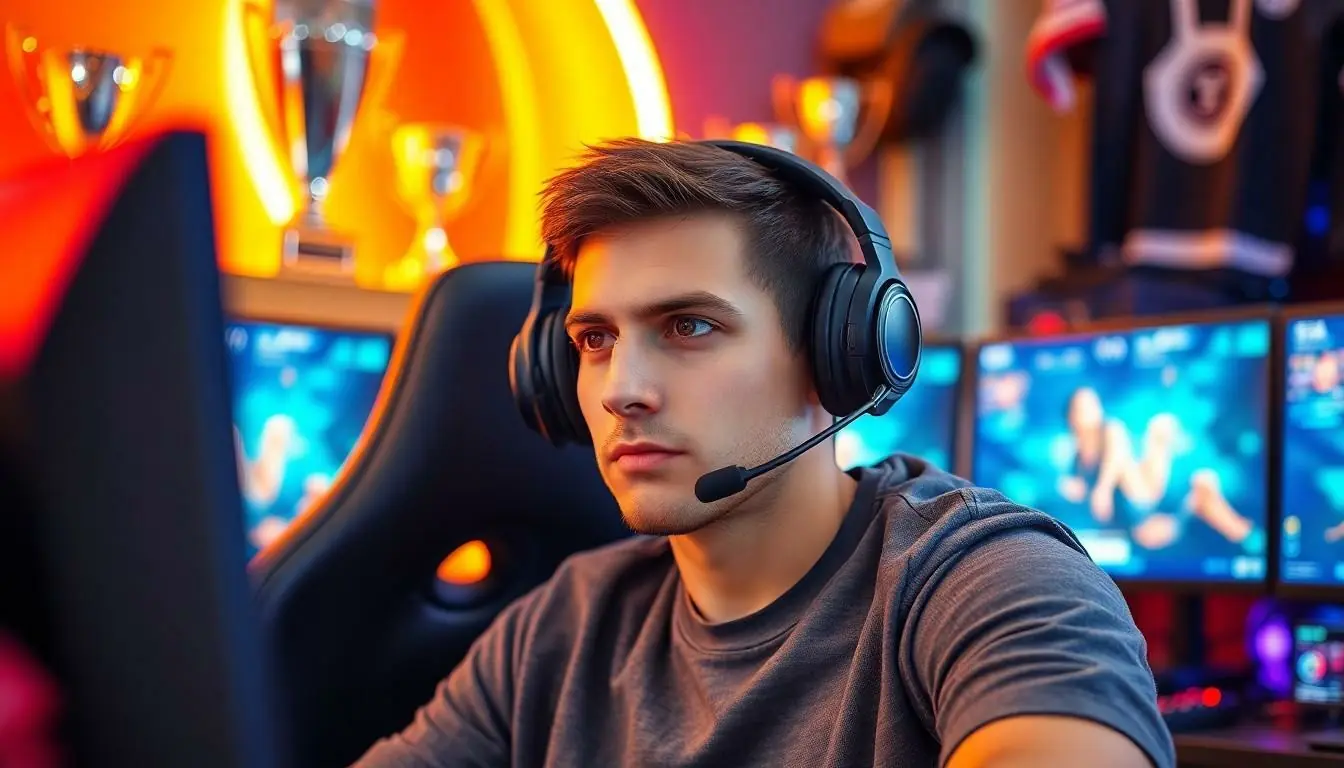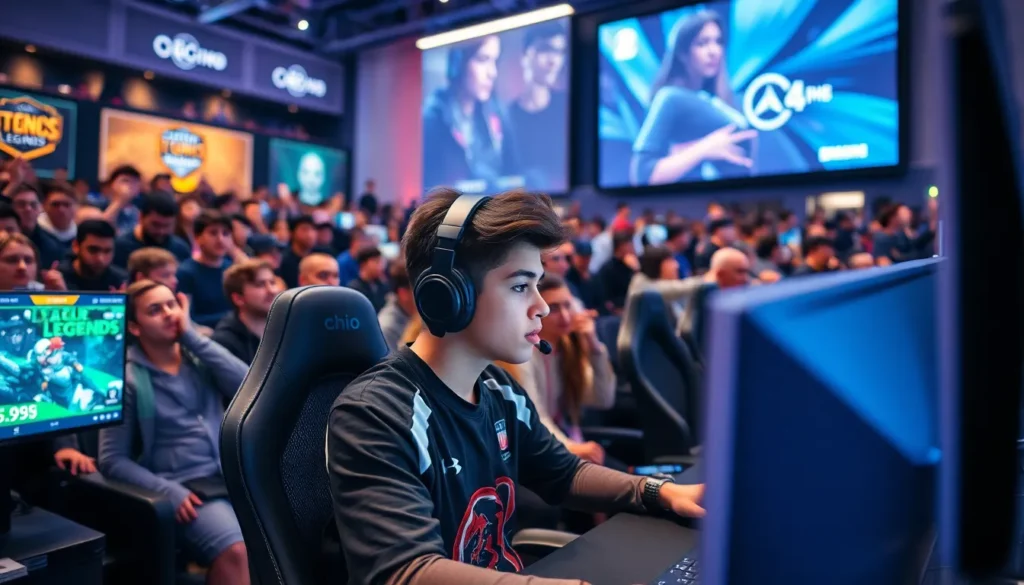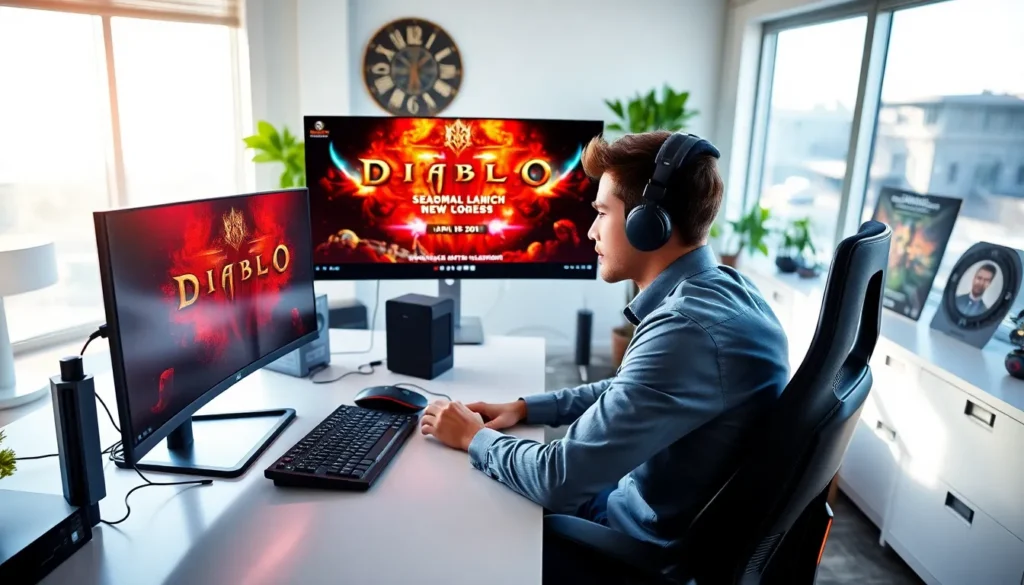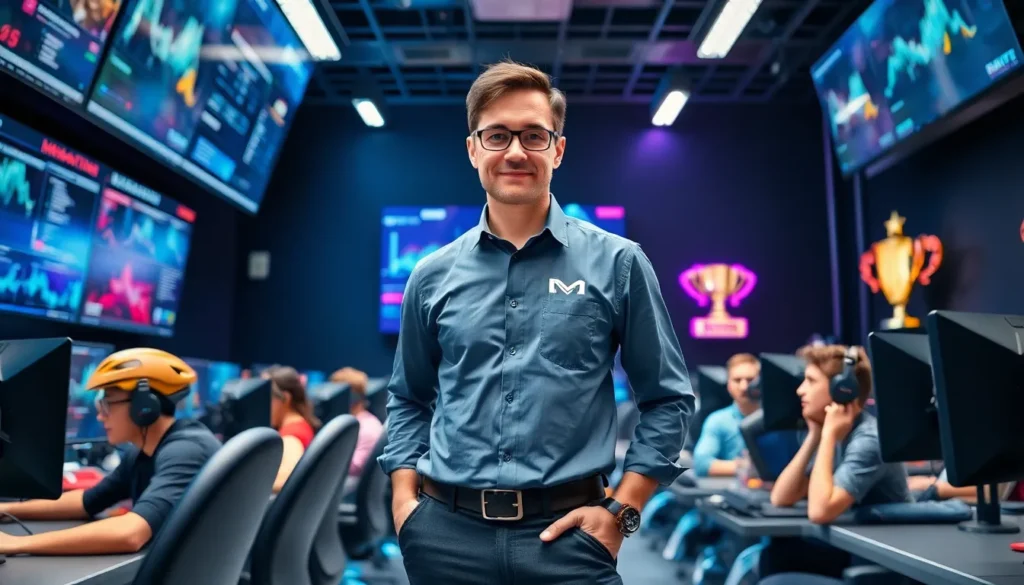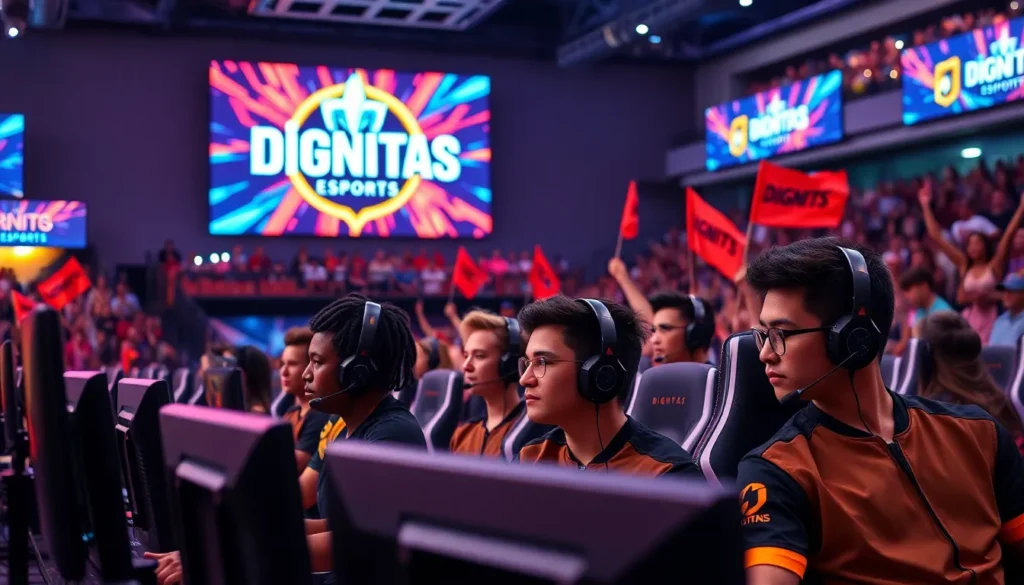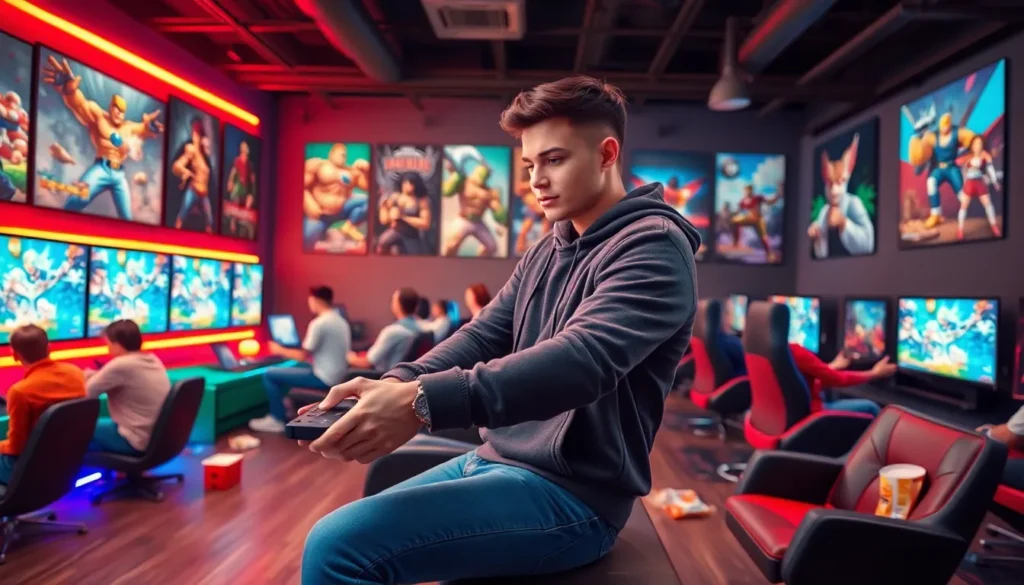In a world where gaming isn’t just a hobby but a full-blown career, esports players are the rock stars of the digital age. Picture this: they’ve got lightning-fast reflexes, strategic minds sharper than a samurai sword, and the ability to multitask like a parent juggling three kids while cooking dinner. These athletes don’t just play games; they dominate them, turning pixels into prize money and fans into fervent followers.
Esports is more than just a trend; it’s a cultural phenomenon. With millions tuning in to watch their favorite players compete, the spotlight is brighter than ever. So, whether they’re fragging foes in a first-person shooter or strategizing in a multiplayer online battle arena, esports players are redefining what it means to be an athlete in the 21st century. Get ready to dive into the electrifying world of competitive gaming and discover what makes these players truly exceptional.
Table of Contents
ToggleOverview of Esports Players
Esports players represent a new generation of athletes distinguished by their extraordinary capabilities. These individuals exhibit exceptional reflex speed, strategic decision-making, and rigorous practice regimens. Players often dedicate several hours daily to honing their skills, participating in extensive training sessions and competitive matches.
This dedication leads to remarkable performances in various genres such as first-person shooters, real-time strategy games, and multiplayer online battle arenas. Tournaments frequently draw large live audiences, supplemented by millions of online viewers who follow these gamers and cheer for them during competitions.
Many esports players achieve celebrity status within the gaming community and beyond. Fans connect deeply with their favorite players, often tracking their careers and lives through social media platforms. Impressive sponsorship deals also emerge from this popularity, reflecting a shift in the sports sponsorship landscape.
Not only do these athletes challenge traditional notions of competitiveness, but they also influence youth culture and lifestyle. The rise of esports encourages gamers worldwide, inspiring them to pursue personal excellence in gaming. Stakeholders in the industry, including developers and sponsors, recognize the economic potential of successful esports players. Economic statistics demonstrate that esports generates substantial revenue, creating career opportunities for those involved in this vibrant ecosystem.
Overall, the emergence of esports players as cultural icons illustrates the powerful synergy between skill, competition, and technology, reshaping how society views athletic accomplishment in the digital realm.
Characteristics of Successful Esports Players
Successful esports players exhibit distinct traits that elevate their performance in competitive gaming. They possess a blend of skills and mental fortitude, crucial for excelling in this dynamic environment.
Skills and Abilities
Quick reflexes play a key role in an esports player’s success. Precision movements allow players to react in real time, often securing victories in fast-paced matches. Knowledge of game mechanics enhances strategic gameplay, enabling players to exploit opponents’ weaknesses effectively. Communication skills are vital for teamwork, allowing players to coordinate strategies seamlessly during tournaments. Adaptability stands out as a critical skill since various games often demand quick adjustments to different scenarios. Mastering multiple characters or roles broadens a player’s versatility, making them formidable in diverse competitive settings.
Mental Toughness
Mental toughness separates top esports players from their peers. Resilience enables players to handle pressure, especially during high-stakes tournaments. Focus remains essential; distractions can lead to costly mistakes. A strong mindset fosters confidence, allowing players to trust their skills in challenging moments. Moreover, managing emotions contributes to maintaining composure; players must remain calm under stress to make sound decisions. Continuous self-improvement reflects their dedication, ensuring they analyze performances and seek growth. Such attributes collectively enhance a player’s competitiveness and overall success in the esports arena.
The Evolution of Esports Players
Esports players have transformed significantly over the years, becoming a dynamic force within the gaming industry. Their journey reflects the growing acceptance and recognition of competitive gaming as a legitimate form of sports.
Historical Background
In the early days of esports, small-scale tournaments attracted limited audiences. Games like “Doom” and “StarCraft” laid foundational stones for competitive play. Major competitions emerged in the late 1990s and early 2000s, introducing titles such as “Counter-Strike” and “Warcraft III.” As the internet became more accessible, the player community expanded rapidly, leading to increased viewership. By the mid-2010s, esports had established itself as a global phenomenon with events that filled arenas and attracted millions of online spectators. Player skill sets evolved naturally alongside game complexity, prompting a rise in dedicated training regimens and professional teams.
Current Trends
Today, esports players exemplify the epitome of athletic dedication and skill. Streaming platforms like Twitch and YouTube Gaming allow players to reach vast audiences. Sponsorship deals with major brands show increased investment in players and teams. The diversity of games continues to rise—from battle royales like “Fortnite” to strategy games such as “League of Legends.” Teams focus on holistic player development, incorporating mental coaching and physical fitness into training. Metrics for success now extend beyond game wins, including social media engagement and branding prowess. Spectators increasingly interact with players through social channels, creating a thriving community atmosphere that strengthens player-fan connections.
Training Regimens for Esports Players
Esports players engage in rigorous training regimens that encompass several factors essential for peak performance.
Practice Schedules
Deliberate practice comprises structured schedules where players dedicate 8 to 12 hours daily to gameplay. Most players break this time into focused sessions, typically lasting 2 to 4 hours, followed by strategic breaks. Consistent practice allows players to refine skills, enhance team coordination, and master game mechanics. They analyze past performances to pinpoint areas for improvement and adjust strategies accordingly. Tournament preparation often includes scrimmages against other teams, simulating competitive environments. Balancing practice with downtime fosters mental resilience and prevents burnout.
Nutrition and Health
Proper nutrition plays a pivotal role in optimizing esports performance. Balanced diets include carbohydrates for energy, proteins for muscle recovery, and healthy fats for sustained focus. Many players often consume specific supplements to enhance cognitive function and endurance. Hydration remains crucial, as even slight dehydration can impair concentration. Regular sleep patterns also contribute to peak cognitive performance, affecting reaction times and decision-making. Players frequently consult nutritionists to tailor diets that support their individual needs, ensuring they maintain physical and mental health in a demanding environment.
The Impact of Esports Players in Popular Culture
Esports players influence popular culture significantly, commanding attention comparable to traditional athletes. Their exceptional skills resonate with fans, creating a new archetype of heroism. Engagement on social media platforms allows followers to connect with players in real-time, fostering community. Players’ personalities often shine through streaming sessions, making them relatable figures in the gaming realm.
Tournaments draw immense audiences, showcasing the popularity of esports and captivating millions globally. Record-breaking viewership during major competitions demonstrates how deeply embedded esports are in contemporary entertainment. Successful players not only excel in gameplay but also market themselves effectively, generating substantial incomes through sponsorship and merchandise. Esports generates revenue exceeding USD 1 billion, illustrating its robust economic impact.
The cultural landscape transforms as brands increasingly collaborate with gamers, altering the traditional sports marketing framework. Advertisements merge seamlessly with gameplay, enhancing the viewer experience and promoting product awareness. Many players leverage their platforms for advocacy, championing causes such as mental health awareness and diversity in gaming. Through these efforts, esports players promote positive change and inspire younger generations.
Moreover, iconic franchises often embed esports elements within their narratives, blending gaming with mainstream media. Documentaries and series spotlight the journey of top players, connecting audiences with their stories. The visibility of esports in pop culture fosters acceptance, broadening the understanding of what it means to be an athlete.
Crossover events, where traditional sports and esports collide, exemplify the merging of these worlds, solidifying esports players’ roles in popular culture. It’s evident that the emergence of esports has revolutionized societal perceptions of competition and excellence in the digital age.
Conclusion
Esports players have carved out a unique niche in the modern entertainment landscape. Their dedication and skill not only redefine athleticism but also inspire countless gamers to pursue their passions. As the industry continues to grow, these players will likely play an even more prominent role in shaping youth culture and community engagement.
With their remarkable abilities and the rise of global tournaments, esports players are not just competitors but also cultural icons. They represent a new era of sports that blends technology with traditional competition, paving the way for future generations to follow in their footsteps. The journey of esports players is just beginning, and their influence will undoubtedly continue to expand.

